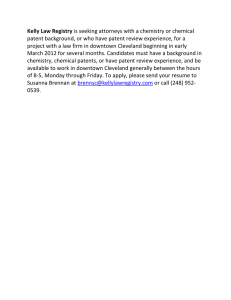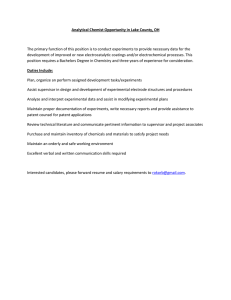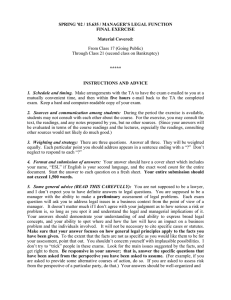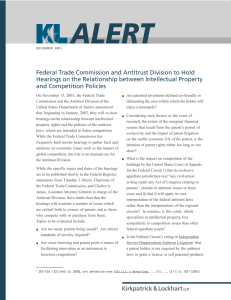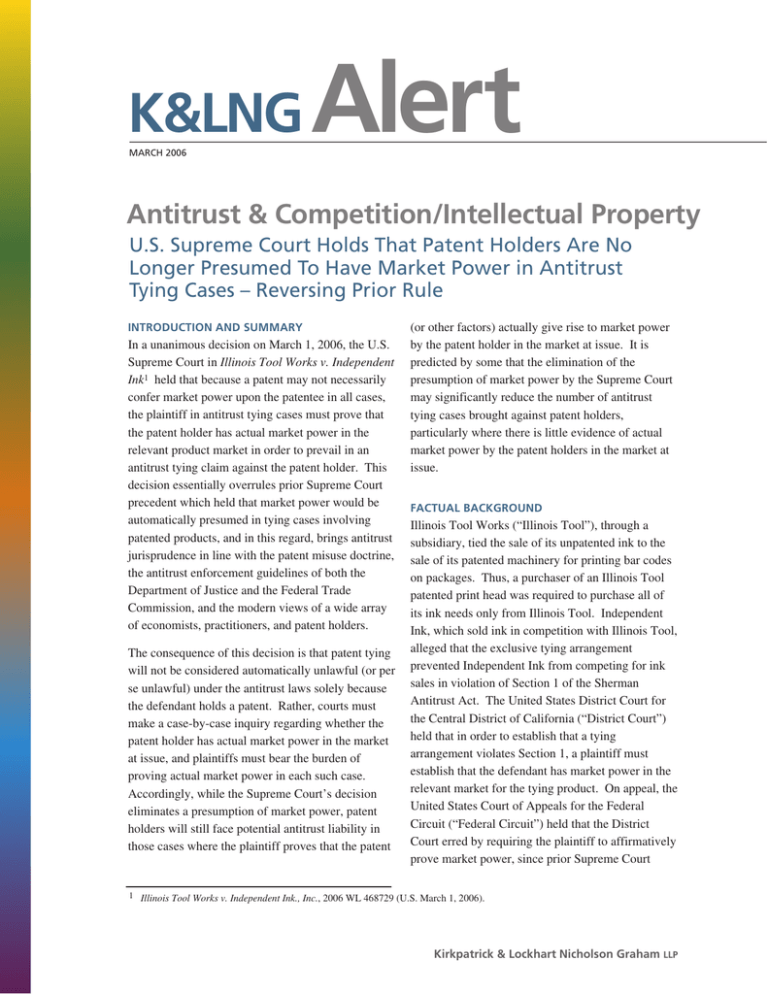
K&LNG
MARCH 2006
Alert
Antitrust & Competition/Intellectual Property
U.S. Supreme Court Holds That Patent Holders Are No
Longer Presumed To Have Market Power in Antitrust
Tying Cases – Reversing Prior Rule
INTRODUCTION AND SUMMARY
In a unanimous decision on March 1, 2006, the U.S.
Supreme Court in Illinois Tool Works v. Independent
Ink1 held that because a patent may not necessarily
confer market power upon the patentee in all cases,
the plaintiff in antitrust tying cases must prove that
the patent holder has actual market power in the
relevant product market in order to prevail in an
antitrust tying claim against the patent holder. This
decision essentially overrules prior Supreme Court
precedent which held that market power would be
automatically presumed in tying cases involving
patented products, and in this regard, brings antitrust
jurisprudence in line with the patent misuse doctrine,
the antitrust enforcement guidelines of both the
Department of Justice and the Federal Trade
Commission, and the modern views of a wide array
of economists, practitioners, and patent holders.
The consequence of this decision is that patent tying
will not be considered automatically unlawful (or per
se unlawful) under the antitrust laws solely because
the defendant holds a patent. Rather, courts must
make a case-by-case inquiry regarding whether the
patent holder has actual market power in the market
at issue, and plaintiffs must bear the burden of
proving actual market power in each such case.
Accordingly, while the Supreme Court’s decision
eliminates a presumption of market power, patent
holders will still face potential antitrust liability in
those cases where the plaintiff proves that the patent
(or other factors) actually give rise to market power
by the patent holder in the market at issue. It is
predicted by some that the elimination of the
presumption of market power by the Supreme Court
may significantly reduce the number of antitrust
tying cases brought against patent holders,
particularly where there is little evidence of actual
market power by the patent holders in the market at
issue.
FACTUAL BACKGROUND
Illinois Tool Works (“Illinois Tool”), through a
subsidiary, tied the sale of its unpatented ink to the
sale of its patented machinery for printing bar codes
on packages. Thus, a purchaser of an Illinois Tool
patented print head was required to purchase all of
its ink needs only from Illinois Tool. Independent
Ink, which sold ink in competition with Illinois Tool,
alleged that the exclusive tying arrangement
prevented Independent Ink from competing for ink
sales in violation of Section 1 of the Sherman
Antitrust Act. The United States District Court for
the Central District of California (“District Court”)
held that in order to establish that a tying
arrangement violates Section 1, a plaintiff must
establish that the defendant has market power in the
relevant market for the tying product. On appeal, the
United States Court of Appeals for the Federal
Circuit (“Federal Circuit”) held that the District
Court erred by requiring the plaintiff to affirmatively
prove market power, since prior Supreme Court
1 Illinois Tool Works v. Independent Ink., Inc., 2006 WL 468729 (U.S. March 1, 2006).
Kirkpatrick & Lockhart Nicholson Graham LLP
cases clearly established that in tying cases a patent
was presumed to give the patent holder market
power and that actual proof of market power was not
required.
The Supreme Court granted certiorari to answer
“whether the presumption of market power in a
patented product should survive as a matter of
antitrust law despite its demise in patent law.”
Illinois Tool Works, 2006 WL 468729, at *3. The
Supreme Court held that it did not.
PATENT MISUSE
In reaching its decision, the Court first noted that the
patent market power presumption in antitrust cases
had its roots in the patent misuse laws. The Court
then relied heavily on Congress’ changes to the
patent laws in 1988, which required a showing of
market power for a patent misuse defense. The
patent market power presumption first arose in the
antitrust context in International Salt, which relied
heavily on Morton Salt, a patent misuse case.
International Salt Co. v. United States, 332 U.S. 392
(1947); Morton Salt Co. v. G.S. Suppiger Co., 314
U.S. 488 (1942). In Morton Salt, the Supreme Court
had held, without analysis of the market conditions,
that the tying of a purchase of an unpatented good to
a patented good was an unlawful extension of the
patent’s monopoly. Morton Salt, 314 U.S. at 490.
The Court observed in the present case that once
Congress abandoned this presumption in the patent
context in 1988, it made no sense to retain it in the
antitrust context, particularly where antitrust liability
imposed criminal and civil penalties which were
much harsher than the patent misuse penalties.
Noting that it “would be absurd to assume that
Congress intended to provide that the use of a patent
that merited punishment as a felony would not
constitute ‘misuse,’” the Court streamlined the two
doctrines by requiring proof of market power in the
relevant market for a tying violation, rather than
continuing to rely on a presumption. Illinois Tool
Works, 2006 WL 468729, at *10.
Although the Court was asked to retain the
presumption of market power as a rebuttable
presumption, the Court rejected such a compromise,
finding no support in antitrust statutes or case law
for even a rebuttable presumption. The Court then
remanded the case to give Independent Ink an
opportunity to present evidence of market power in
the absence of the presumption.
COMMENTARY
The Court also noted that scholars and economists
alike have advocated the change which the Court
adopted. A vast majority of economic literature has
advocated that one should not presume that a patent
automatically or necessarily confers market power.
ANTITRUST GUIDELINES
The Court also relied on the decision by the
Department of Justice and the Federal Trade
Commission to analyze patent antitrust cases
without presuming that the patent holder has market
power in the product market at issue before
prosecuting patent tying cases pursuant to their
antitrust guidelines.2 In 1995, the Department of
Justice and the Federal Trade Commission stated
that in the exercise of their prosecutorial discretion,
they “will not presume a patent, copyright, or trade
secret necessarily confers market power upon its
owner.” U.S. Dept. of Justice and FTC, Antitrust
Guidelines for the Licensing of Intellectual Property
§ 2.2 (Apr. 6, 1995), available at
http://www.usdoj.gov/atr/public/guidelines/0558.pdf
(as visited March 3, 2006).
Thus, enforcement agencies as well are choosing to
prosecute only those cases where the patent owner
can be shown to have market power in the relevant
product market.
CONCLUSION
The Supreme Court’s rejection of the presumption of
market power in patent tying cases brings antitrust
jurisprudence closer in line with the broad modern
view that not all patents necessarily confer market
2 The antitrust guidelines are jointly promulgated by the Department of Justice and the Federal Trade Commission, the branches of
government that enforce the antitrust laws. The antitrust guidelines are used by the government in prosecuting antitrust violations
and, although the guidelines are not binding on any court, they are often viewed as persuasive, as the Court viewed them here.
2
Kirkpatrick & Lockhart Nicholson Graham
LLP
|
MARCH 2006
power and that not all tying arrangements should be
presumed to be anticompetitive. This case further
erodes the anti-tying sentiments of Standard Oil,
where the Court opined that “tying arrangements
serve hardly any purpose beyond the suppression of
competition.” Standard Oil Co. of Cal. v. United
States, 332 U.S. 293, 305-306 (1949). The Court
now has observed that “many tying arrangements,
even those involving patents and requirements ties,
are fully consistent with a free, competitive market.”
Illinois Tool Works, 2006 WL 468729, at *11.
For antitrust and patent law practitioners, this
decision places a heavier burden on plaintiffs
asserting antitrust liability based on tying
arrangements involving patented products. The
decision may discourage some would-be antitrust
plaintiffs from bringing tying suits because of the
additional time and money that will be required to
prove market power in such suits. Courts (and
parties) no longer have an easy presumption to guide
their decision, but must evaluate actual proof of the
existence of market power in patent tying cases on a
case by case basis in order to determine potential
liability under the antitrust laws.
Larissa S. Bifano
lbifano@klng.com
617.951.9139
Karen A. Schouten
kschouten@klng.com
617.261.3216
Jennifer F. Shugars
jshugars@klng.com
412.355.8372
Daniel J. Sponseller
dsponseller@klng.com
412.355.8650
If you have questions about this topic or would like more information on Kirkpatrick & Lockhart Nicholson Graham LLP,
please contact one of our lawyers listed below:
LONDON
PALO ALTO
Neil Baylis
44.20.7360.8140 nbaylis@klng.com
Laura Harcombe
44.20.7360.8186 lharcombe@klng.com
William N. Hebert
650.798.6771 whebert@klng.com
PITTSBURGH
NEW YORK
Douglas F. Broder
James E. Scheuermann 412.355.6215 jscheuermann@klng.com
212.536.4808 dbroder@klng.com
Thomas A. Donovan
412.355.6466 tdonovan@klng.com
www.klng.com
BOSTON • DALLAS • HARRISBURG • LONDON • LOS ANGELES • MIAMI • NEWARK • NEW YORK • PALO ALTO • PITTSBURGH • SAN FRANCISCO • WASHINGTON
Kirkpatrick & Lockhart Nicholson Graham (K&LNG) has approximately 1,000 lawyers and represents entrepreneurs, growth and middle market companies,
capital markets participants, and leading FORTUNE 100 and FTSE 100 global corporations nationally and internationally.
K&LNG is a combination of two limited liability partnerships, each named Kirkpatrick & Lockhart Nicholson Graham LLP, one qualified in Delaware, U.S.A. and
practicing from offices in Boston, Dallas, Harrisburg, Los Angeles, Miami, Newark, New York, Palo Alto, Pittsburgh, San Francisco and Washington and one
incorporated in England practicing from the London office.
This publication/newsletter is for informational purposes and does not contain or convey legal advice. The information herein should not be used or relied
upon in regard to any particular facts or circumstances without first consulting a lawyer.
Data Protection Act 1988—We may contact you from time to time with information on Kirkpatrick & Lockhart Nicholson Graham LLP seminars and with our
regular newsletters, which may be of interest to you. We will not provide your details to any third parties. Please e-mail cgregory@klng.com if you would
prefer not to receive this information.
© 2006 KIRKPATRICK & LOCKHART NICHOLSON GRAHAM LLP. ALL RIGHTS RESERVED.

